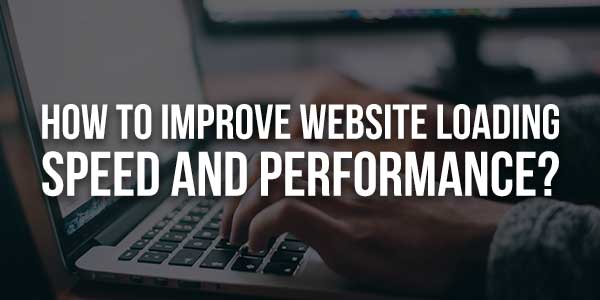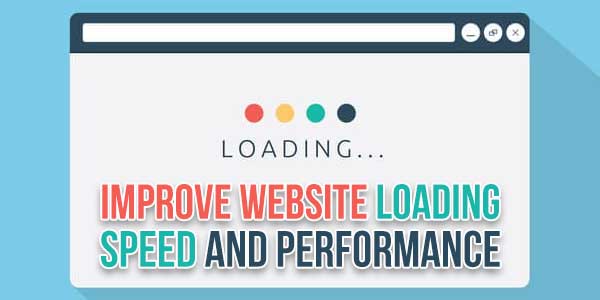
SEO is not only the key to a successful, high-ranking website. A high-performing website is. Confirm with your web development company; they would definitely mention that your website’s performance rate plays a pivotal part.
In fact, a fast, high-performing website enhances the SEO of a website, increases the conversion rate, and not to forget offers visitors a smooth, uninterrupted website experience.
With this article, we’ll walk you through tried & tested ways to improve your website loading speed & also get some real insights from expert web developers Ireland to help you open the gateways of a more lead-generating website.
So what is the website loading speed & performance of your website?
Table of Contents
What Is Website Loading Speed?
Website loading speed refers to the time it takes for your website to show up to the users. The faster your website loads, the faster your website loading speed is; the slower your website loads, the slower your website loading speed is. The time it takes to load your website is usually in seconds and may extend to a minute or so. With the website’s loading frequency, the website’s performance is determined.
How To Check The Website Loading Speed Of The Website?
You can generally know whether your website is fast or slow by opening it; the longer it takes to load, the slower your website is & vice versa. But if you want an accurate picture with exact statistics of your website, then Google, the top search engine itself, provides an excellent tool to measure your website’s loading speed.
Here is the link to find your website’s loading speed → https://pagespeed.web.dev/
The tool is a simple one; Add your website’s link, and tadaaaa; you get all insights about how your website is performing. Moreover, you will also get inputs about where you can improve & what’s hindering your website from becoming high-performing.
Any figure below 90 is not a good sign. You will need to work on your website’s performance & amp up your website development.
This tool is a quick way to know your website’s weak points and develop solutions to increase your website loading speed & make your website high-performing.
Moving on, let’s look into how you can improve the website’s loading speed & performance.

7 Top Ways To Improve The Website’s Loading Speed:
Choose A Good Website Hosting Option:
One of the important reasons why some websites don’t perform optimally is that cheap and over-loaded hosting servers back them.
If your host server is not good, it will directly affect your website’s performance & will increase your website loading speed.
Before you build your website, you must ensure your website development firm uses a trusted, reliable host. Because if your hosting server is not good, it is definitely going to affect your speed & performance, no matter how many other high-end changes you make.
In fact, we suggest that you specifically go for robust performance-oriented hosts, which are designed to give great results throughout.
Optimize Your Visuals:
We agree that your goal is to offer visitors an attractive, appealing website experience through high-end visuals. But remember, take care that it doesn’t hinder your website’s performance.
Visuals like images & videos definitely enhance your website’s looks and feel, but they do take up most of the internet traffic owing to their bulkiness.
You should integrate high-quality visuals, but at the same time, you should ensure to optimize them so that they don’t take up most of your website’s load. Images, videos, gifs, etc. should be rightly compressed before integrating into the website.
Moreover, you can suggest your partnered web development company in Ireland use plugins like WP Smush or an app like Squoosh, which can automatically compress your images & videos according to your website needs.
By optimizing your visuals, you will give a boost to your website loading speed & performance.
Ensure Your Website Is Cached:
Caching is one of the powerful ways to boost your website’s performance. Every time you upload a new page, you should get it cached first.
No doubt, crawlers take their time to approach your page and get it cached. But search engines even provide an option of manual caching; enable that option.
If your website is a CMS – Content Management System, which includes regularly uploading new content like blogs, articles, books, etc., then you should ensure you get your new page cache regularly too.
The reason website caching plays a major part is that through caching, your website’s data gets stored & reduces the load on your server, boosting your website performance.
You can integrate many plugins into your website and get your website cache frequently.
Eliminate Unnecessary Redirects:
Redirects can harm your website’s loading speed. Every time a visitor may click on a redirected link, it extends the HTTPS request, and the response time increases.
Thus, don’t give too many redirect links, & try to eliminate as many unnecessary redirects as possible.
In WordPress, there’s an option to reduce redirects, you can make use of that and resolve as many redirects as possible.
Optimise CSS, JS & HTML:
Your website loading time can also be affected if your code is filled with nonessential elements like extra semicolons, spaces, bars, lines, brackets, etc.
Review your code & minify your CSS, HTML, and JavaScript, and reduce the size of your coding. The component may look so tiny, and you may not feel that they would affect the performance, but if taken as a whole, they form a chunk of unnecessary components, which might be hampering your website’s loading speed. Optimize your code & only keep the code that is result-oriented.
Enable Browser Caching:
Another way to improve your website loading speed & performance is to enable browser caching. Browser caching gives lightning-fast results & nullifies the page-to-page loading time. Through browser caching, you can store the data of the most recently downloaded web pages & so when you return to that page later, you won’t have to download it again as it is readily available on your browser.
Moreover, you can enable browser caching on both the client and the website visitors’ sides to give your users a fuss-free, no-delay experience.
Avoid/Remove Unnecessary Plugins:
Another way to beat those long website loading times is to avoid unnecessary plugins. No doubt, plugins are also essential to lessen your web load time, but some plugins don’t and can instead prove to be stressors on your website servers, which will eventually lay out poor website performance.
Don’t integrate plugins where you can code and create a solution, as that plugins may prove to be unnecessary.
Therefore, another brilliant way is to avoid those unnecessary plugins and build a platform backed by solid code rather than plugins.
Moreover, for example, you already have a website. In that case, you can check your website thoroughly, make notes of the existing plugins & remove the plugins which are no longer in use & increase your website performance brilliantly.
Now that we have a list of ways to improve a website’s performance, let’s know why website loading speed & performance matter.
Why Website Loading Speed Matters?
Users have millions of options available on the web. So think about it, if you don’t have a fast website load time, then they can quickly move on to the next website. Currently, the average bounce rate is 3 seconds, and after 3 seconds, if your website doesn’t load your visitor will bounce off & go to the next website which offers the same service. So you can imagine the importance of having less website loading speed.
Moreover, website speed is also related to SEO, a fast website will also enhance SEO.
Besides, if you offer quick results to your customers, they will love it and will likely form a good impression of you. If you want your website to have a high-performance rate, follow the tips above & improve your website and out.
To Wrap Up:
Signing off, we hope you understand the importance of keeping an optimized website because every second counts when it comes to leads & sales! One second more load time can create a bounce right there.
Therefore, test your website regularly, carry out changes & keep improving, and you will see your website flourish.
All the best 🙂

 About the Author:
About the Author:












Be the first to write a comment.